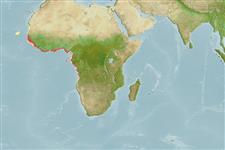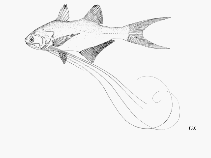Pentanemus quinquarius (Linnaeus, 1758)
Royal threadfin
Add your observation in Fish Watcher
| Native range | All suitable habitat | Point map | Year 2050 |

|
| This map was computer-generated and has not yet been reviewed. |
| Pentanemus quinquarius AquaMaps Data sources: GBIF OBIS |
Upload your photos and videos
Pictures | Google imagePentanemus quinquarius
Picture by FAO
Pictures | Google imagePentanemus quinquarius
Picture by FAO
Sierra Leone country information
Common names:
Bearbear, Beardfish
Occurrence: native
Salinity: brackish
Abundance: | Ref:
Importance: minor commercial | Ref: FAO, 1994
Aquaculture: | Ref:
Regulations: | Ref:
Uses: no uses
Comments:
National Checklist:
Country Information: https://www.cia.gov/library/publications/resources/the-world-factbook/geos/sl.html
National Fisheries Authority:
Occurrences: Occurrences Point map
Main Ref: Kamara, A.B., 1977
National Database:
Occurrence: native
Salinity: brackish
Abundance: | Ref:
Importance: minor commercial | Ref: FAO, 1994
Aquaculture: | Ref:
Regulations: | Ref:
Uses: no uses
Comments:
National Checklist:
Country Information: https://www.cia.gov/library/publications/resources/the-world-factbook/geos/sl.html
National Fisheries Authority:
Occurrences: Occurrences Point map
Main Ref: Kamara, A.B., 1977
National Database:
Common names from other countries
Classification / Names Nombres comunes | Sinónimos | Catalog of Fishes(Género, Especie) | ITIS | CoL | WoRMS | Cloffa
> Carangaria/misc (Various families in series Carangaria) > Polynemidae (Threadfins)
Etymology: Pentanemus: Greek, pente = five + Greek, nema = filament (Ref. 45335).
More on author: Linnaeus.
Etymology: Pentanemus: Greek, pente = five + Greek, nema = filament (Ref. 45335).
More on author: Linnaeus.
Environment: milieu / climate zone / depth range / distribution range Ecología
marino; salobre demersal; rango de profundidad 10 - 70 m (Ref. 10799). Tropical; 21°N - 18°S, 27°W - 14°E (Ref. 57343)
Distribución Países | Áreas FAO | Ecosistemas | Ocurrencias, apariciones | Point map | Introducciones | Faunafri
Eastern Atlantic: Senegal to Angola (Ref. 57402). Also reported from Mauritania (Ref. 10799) and Cape Verde (Ref. 27000). Reported from Cuba based on a single specimen; no other specimens taken from the western Atlantic (Ref. 57343).
Length at first maturity / Tamaño / Peso / Age
Maturity: Lm 15.0 range ? - 17 cm
Max length : 35.0 cm TL macho / no sexado; (Ref. 57402); common length : 25.0 cm TL macho / no sexado; (Ref. 3659)
Max length : 35.0 cm TL macho / no sexado; (Ref. 57402); common length : 25.0 cm TL macho / no sexado; (Ref. 3659)
Short description Claves de identificación | Morfología | Morfometría
Espinas dorsales (total) : 9; Radios blandos dorsales (total) : 14 - 18; Espinas anales: 3; Radios blandos anales: 28 - 30. Diagnosis: detached pectoral filaments very long, exceeding body length; base of anal fin much longer than base of 2nd dorsal fin; body moderately elongate and compressed, its height comprised 3.0-3.4 in standard length; snout very short, blunt and prominent; mouth inferior; maxillary bone strongly widened at its end, reaching largely past eye; 2 widely separated dorsal fins, 1st with 8 flexible spines, 2nd with 1 spine and 14-18 soft rays; anal fin base much longer than 2nd dorsal fin base; pectoral fin inserted very low on body; threadlike filaments, 5 in number, 4 of them longer than total length of fish; scales ctenoid; head scaly (Ref. 57402).
Coloration: body uniformly silvery, greyish on back, shading to whitish ventrally; fins tinged with yellow (Ref. 57402).
Occurs over sandy (Ref. 2683) and muddy bottoms in shallow waters (Ref. 57343), frequently in brackish waters (Ref. 57343, 57402) and estuaries (Ref. 57402). Carnivorous (Ref. 57402), feeds on fish and shrimps (Ref. 28587).
Life cycle and mating behavior Madurez | Reproducción | Puesta | Huevos | Fecundidad | Larva
Main reference
Upload your references | Referencias | Coordinador | Colaboradores
Motomura, H., 2004. Threadfins of the world (Family Polynemidae). An annotated and illustrated catalogue of polynemid species known to date. FAO Spec. Cat. Fish. Purp. Rome: FAO. 3:117 p. (Ref. 57343)
IUCN Red List Status (Ref. 130435: Version 2024-2)
Vulnerable, ver lista roja de la UICN (VU) (A2bd); Date assessed: 15 July 2014
Threat to humans
Harmless
Human uses
Pesquerías: muy comercial
FAO(pesquerías: producción; publication : search) | FishSource | Sea Around Us
Más información
Trophic ecology
componentes alimenticios
Composición de la dieta
consumo de alimento
Food rations
Despredadores
componentes alimenticios
Composición de la dieta
consumo de alimento
Food rations
Despredadores
Population dynamics
Coeficiente del crecimiento para
Max. ages / sizes
Length-weight rel.
Length-length rel.
Length-frequencies
Mass conversion
Reclutamiento
Abundancia
Coeficiente del crecimiento para
Max. ages / sizes
Length-weight rel.
Length-length rel.
Length-frequencies
Mass conversion
Reclutamiento
Abundancia
Life cycle
Reproducción
Madurez
Fecundidad
Puesta
Spawning aggregations
Huevos
Egg development
Larva
Dinámica larvaria
Reproducción
Madurez
Fecundidad
Puesta
Spawning aggregations
Huevos
Egg development
Larva
Dinámica larvaria
Anatomy
Superficie branquial
Brain
Otolith
Superficie branquial
Brain
Otolith
Physiology
Body composition
Nutrients
Consumo del oxígeno
Tipo de natación
Velocidad de natación
Visual pigments
Fish sound
Diseases & Parasites
Toxicity (LC50s)
Body composition
Nutrients
Consumo del oxígeno
Tipo de natación
Velocidad de natación
Visual pigments
Fish sound
Diseases & Parasites
Toxicity (LC50s)
Genetics
Genética
Heterozygosity
heritabilidad
Genética
Heterozygosity
heritabilidad
Human related
Aquaculture systems
Perfiles de acuicultura
Razas
Ciguatera cases
Stamps, coins, misc.
Aquaculture systems
Perfiles de acuicultura
Razas
Ciguatera cases
Stamps, coins, misc.
Herramientas
E-book | Guía de campo | Claves de identificación | Asistente para frecuencias de tallas | Herramienta de ciclo de vida | Mapa de puntos | Classification Tree
| Catch-MSY |
Special reports
Download XML
Fuentes de Internet
Aquatic Commons | BHL | Cloffa | Websites from users | Check FishWatcher | CISTI | Catalog of Fishes(Género, Especie) | DiscoverLife | ECOTOX | Faunafri | Fishtrace | GenBank(genome, nucleotide) | GloBI | GOBASE | | Google Books | Google Scholar | Google | IGFA World Record | MitoFish | Otolith Atlas of Taiwan Fishes | PubMed | Reef Life Survey | Scirus | SeaLifeBase | Árbol de la vida | Wikipedia(Go, búsqueda) | World Records Freshwater Fishing | Expediente Zoológico
Estimates based on models
Preferred temperature (Ref. 115969): 20.2 - 27.9, mean 25.8 (based on 70 cells).
Phylogenetic diversity index (Ref. 82804): PD50 = 1.0000 [Uniqueness, from 0.5 = low to 2.0 = high].
Bayesian length-weight: a=0.00398 (0.00236 - 0.00672), b=3.13 (2.99 - 3.27), in cm Total Length, based on LWR estimates for this species & (Sub)family-body (Ref. 93245).
Nivel trófico (Ref. 69278): 3.6 ±0.57 se; based on food items.
Resiliencia (Ref. 120179): Alto, población duplicada en un tiempo mínimo inferior a 15 meses (K=0.72).
Fishing Vulnerability (Ref. 59153): Low to moderate vulnerability (31 of 100).
Climate Vulnerability (Ref. 125649): High to very high vulnerability (75 of 100).




